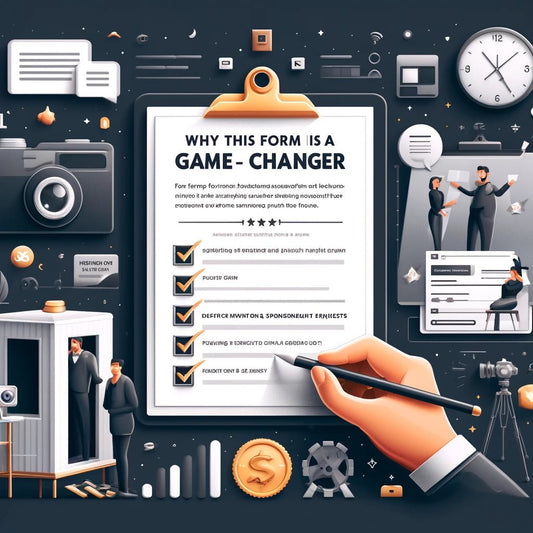
Boost Your Corporate Events with Cutting-Edge Technology
Share
.jpg)
Corporate event technology has become an integral part of organizing successful events in the modern era. It refers to the use of various digital tools, software, and platforms to enhance the planning, execution, and overall experience of corporate events. The importance of corporate event technology cannot be overstated, as it streamlines processes, increases engagement, and delivers a seamless event experience for both organizers and attendees.
There are various types of corporate event technology that can be utilized. These include event management software, virtual/augmented reality, live streaming and webinars, social media integration, and mobile apps. Each of these technologies serves a specific purpose, such as simplifying event logistics, creating immersive experiences, facilitating remote participation, amplifying social media reach, and providing personalized event information and communication.
Using corporate event technology offers numerous benefits to organizations. Firstly, it improves efficiency and productivity by automating tasks, reducing manual labor, and streamlining communication. it enhances attendee engagement by offering interactive features, personalized content, and networking opportunities. Corporate event technology also enables better data collection and analysis, allowing organizers to gather valuable insights and make informed decisions. Lastly, it contributes to cost savings by minimizing the need for printed materials, optimizing resource allocation, and reducing logistical expenses.
However, implementing corporate event technology may come with challenges and considerations. Costs and budget constraints can pose a challenge for organizations, as some technologies may require significant investments. Technical challenges and integration issues with existing systems can also arise. Security and privacy concerns need to be addressed to protect sensitive data. Furthermore, training and adoption of new technologies by staff and attendees may require planning and support.
To successfully incorporate corporate event technology, organizations should follow best practices. Clearly defining goals and objectives is essential to choose the right technology and features to meet specific event requirements. Planning and testing in advance help ensure the smooth execution of the event technology. Adequate support and training should be provided to both organizers and attendees to ensure a seamless experience.
Looking towards the future, the trends in corporate event technology indicate further advancements. Artificial intelligence and machine learning technologies are expected to play a significant role in automating processes and personalizing event experiences. Immersive technologies like virtual and augmented reality will continue to deliver unique and engaging event experiences. Hybrid and virtual events are likely to gain more traction, providing organizations with the flexibility to cater to diverse attendee preferences.
By embracing corporate event technology and staying updated with emerging trends, organizations can elevate their events, create impactful experiences, and achieve their event objectives with greater efficiency and effectiveness.
What is Corporate Event Technology?
Corporate Event Technology: Enhancing and Streamlining Corporate Events
Corporate event technology revolutionizes corporate events by incorporating technological tools and solutions to enhance efficiency and streamline processes. This encompasses a diverse range of applications, including event registration and ticketing systems, event management platforms, and virtual event platforms. By leveraging corporate event technology, event organizers can automate tasks, elevate attendee experiences, gather valuable data and analytics, and maximize event ROI. With technological advancements, virtual and hybrid events have gained immense popularity due to their immersive and interactive nature. Pro-tip: Before selecting corporate event technology, carefully consider your event objectives, budget, and requirements to ensure you choose the most suitable and efficient solutions.
Why is Corporate Event Technology Important?
Why is Corporate Event Technology Important?
Corporate event technology is important for modern businesses as it plays a crucial role in enhancing productivity, engagement, and overall success. By incorporating advanced event technologies, companies can streamline event planning, simplify registration processes, and ensure seamless communication. This not only saves time and reduces costs but also boosts attendee satisfaction, making the event experience more impactful.
Incorporating event technologies like virtual reality and interactive presentations creates a lasting impression on attendees, making the event memorable and impactful. Companies that embrace corporate event technology demonstrate their commitment to innovation and stay ahead of the competition. It enables businesses to effectively connect with their audience and achieve their event objectives.
Types of Corporate Event Technology
Discover the exciting world of corporate event technology and the various types that can take your events to new heights. From event management software to virtual and augmented reality experiences, live streaming and webinars, social media integration, and mobile apps, there's a wealth of possibilities to engage and captivate your audience. Stay ahead of the game and reimagine your corporate events with these innovative tech solutions.Event Management Software
Event management software, often referred to as EMS, plays a critical role in the planning and execution of successful corporate events. This powerful tool offers a wide range of features and benefits that significantly contribute to the overall success of an event. Here are some key aspects and advantages of utilizing event management software:
- Streamlined workflow: The key advantage of event management software is its ability to automate various processes such as registration, ticketing, and attendee communication. By handling these tasks efficiently, it saves significant time and effort for event planners.
- Centralized data management: With event management software, event planners can collect and store attendee information all in one place. This centralized approach allows for easy access to data and facilitates thorough analysis, making it simpler to identify patterns and trends.
- Real-time reporting: Equipped with event management software, organizers gain valuable insights into registration numbers, attendee engagement, and revenue on a real-time basis. This empowers them to make informed decisions and accurately measure the success of their events.
- Enhanced attendee experience: Another significant advantage of event management software is its ability to improve the overall satisfaction levels of attendees. It accomplishes this by offering personalized event agendas and facilitating seamless check-in processes, resulting in a more pleasant experience for event participants.
- Collaboration and communication: Effective collaboration between event organizers, vendors, and sponsors is crucial for the smooth coordination of any event. Event management software facilitates seamless communication, enabling all stakeholders to work together towards a common goal.
- Customization and branding: Event management software allows organizers to customize registration forms, event websites, and communication templates to align with their brand image. This promotes brand consistency and ensures a cohesive and professional experience for all attendees.
By leveraging the power of event management software, event planners can elevate their event planning processes significantly. This versatile tool enhances efficiency, allowing organizers to focus on delivering a seamless experience for both attendees and event organizers alike.
Virtual/Augmented Reality
Virtual and augmented reality (VR/AR) are revolutionizing the corporate event industry by creating immersive and interactive experiences for attendees. Using VR/AR, participants can be fully immersed in a virtual environment, which provides them with a unique and engaging experience. Additionally, companies can utilize VR/AR to showcase their products or services and allow attendees to interact with them in a virtual setting. VR/AR can also be effective for training sessions, as employees can practice real-life scenarios within a safe and controlled environment. Furthermore, attendees can virtually visit event venues before the actual event, allowing them to make informed decisions about their attendance. The use of VR/AR also enables personalized experiences for attendees, allowing them to customize their journey through the event. Moreover, VR/AR facilitates virtual networking among participants, fostering meaningful connections. Therefore, incorporating virtual and augmented reality into corporate events not only enhances attendee experiences but also provides companies a competitive edge by utilizing the latest event technologies.
Live Streaming and Webinars
Live streaming and webinars have become essential elements of corporate event technology, providing numerous benefits for both event organizers and attendees. Here is a list of key points to consider when incorporating live streaming and webinars into your corporate events:
- Reach a larger audience: Live streaming allows you to connect with attendees who are unable to attend the event in person, expanding your reach and increasing your event's visibility.
- Cost-effective solution: Live streaming and webinars can be a cost-effective alternative to traditional in-person events, eliminating the need for venue rentals, travel expenses, and other logistical costs.
- Interactive engagement: Platforms for live streaming and webinars offer interactive features such as Q&A sessions, live chats, and polls, enhancing attendee engagement and creating a more immersive experience.
- Convenience and flexibility: Attendees can participate in webinars and live streams from anywhere with an internet connection, providing them with the flexibility to join from their office, home, or even while traveling.
- Analytics and data collection: Live streaming and webinar platforms often provide valuable analytics and data on attendee engagement, allowing event organizers to measure the success of their event and make data-driven improvements.
The rise of live streaming and webinars can be traced back to the early 2000s when advancements in internet technology and video streaming capabilities made it possible for businesses to broadcast live events and engage with remote audiences. Since then, live streaming and webinars have evolved to become integral components of the corporate event landscape, revolutionizing the way businesses connect with their target audiences and expanding the reach of events beyond physical boundaries.
Social Media Integration
Social media integration is an essential aspect of corporate event technology. It plays a crucial role in allowing event planners to harness the power of social media platforms. This integration helps in increasing attendee engagement, reaching a wider audience, and enhancing the overall event experience. There are several key benefits associated with social media integration:
-
Real-time communication: By incorporating social media feeds into event apps or websites, attendees can stay updated and actively participate in event-related discussions.
-
Amplify event reach: Social media integration empowers attendees to share event details, updates, and highlights with their social networks, thereby expanding the reach of the event.
-
Enhance attendee interaction: Through the utilization of social media walls or live feeds, event organizers can encourage attendees to interact with each other, share their experiences, and establish connections.
-
Monitor event feedback: Social media integration provides valuable insights into attendee sentiments, enabling event organizers to promptly address any issues or concerns.
-
Generate user-generated content: Attendees can utilize event-specific hashtags to share photos, videos, and comments on social media platforms, thereby creating a wealth of user-generated content.
A true story exemplifies the significance of social media integration. During a recent conference, attendees were able to share their experiences and insights on social platforms, thanks to this integration. The event gained substantial online attention, leading to an increased number of participants in subsequent years. The resulting social media buzz not only generated valuable feedback but also helped the organizers foster a stronger sense of community among attendees. Overall, social media integration proved to be an effective tool in driving engagement and creating a memorable event experience.
Mobile Apps
Mobile apps have become an essential part of corporate event technology, providing a wide range of advantages and enriching the experience for attendees. Here are some key benefits of utilizing mobile apps at corporate events:
- Efficient registration: Mobile apps make registration and ticketing easy, simplifying the sign-up process for attendees.
- Enhanced engagement: Apps offer interactive features such as live polls, Q&A sessions, and networking platforms, fostering meaningful connections and encouraging active participation from attendees.
- Improved event experience: Mobile apps provide personalized agendas, maps, and real-time schedule updates, ensuring that attendees have all the necessary information conveniently at their fingertips.
- Instant updates: Push notifications and alerts keep attendees informed about any last-minute changes or important announcements in real time.
- Networking opportunities: Mobile apps facilitate networking by allowing attendees to connect with each other, schedule meetings, and exchange contact information.
Benefits of Using Corporate Event Technology
Are you ready to take your corporate events to the next level? In this section, we'll explore how using cutting-edge corporate event technology can bring numerous benefits to your organization. From improved efficiency and productivity to enhanced attendee engagement, better data collection and analysis to substantial cost savings, we'll uncover the advantages that await those who embrace these innovative tools. Get ready to revolutionize your corporate events and leave a lasting impression on your attendees. Let's dive in!Improved Efficiency and Productivity
Incorporating corporate event technology into event planning and management provides key benefits of improved efficiency and productivity. One of the ways in which event technology enhances efficiency and productivity is through streamlined processes. By automating tasks like registration, ticketing, and attendee communication, event management software reduces manual efforts and saves time.
Another way in which event technology enhances efficiency and productivity is through enhanced organization. Digital tools and platforms allow event planners to manage various aspects such as scheduling, budgeting, and logistics in one centralized system, ensuring efficient coordination.
Event technology also facilitates real-time collaboration. Virtual and hybrid event platforms enable remote collaboration among event teams, leading to faster decision-making and smoother execution.
Furthermore, event technology allows for data-driven insights. By collecting and analyzing data, valuable insights on attendee preferences, engagement levels, and overall event success are obtained. This enables informed decision-making.
Efficient communication is also improved through event technology. Integration of social media platforms and mobile apps enhances communication with attendees, delivering real-time updates, event information, and personalized experiences.
Enhanced Attendee Engagement
Enhancing attendee engagement is an essential aspect of corporate event technology. Here are some methods to achieve it:
|
Better Data Collection and Analysis
Better data collection and analysis are fundamental advantages of incorporating corporate event technology. To optimize this process, event planners can seamlessly follow these steps:
- Utilize event management software with built-in data collection features to enhance data gathering and analysis.
- Implement QR codes for attendee check-in and data capture, ensuring a smooth and efficient process.
- Integrate registration software to streamline attendee sign-up processes and improve data collection.
- Leverage wearable event technology to track and collect attendee data in real-time, promoting better analysis.
- Utilize live translation technology to effectively collect and analyze multilingual data, enhancing the accuracy and comprehensiveness of the analysis.
- Make an investment in event marketing software to track and analyze data related to promotional efforts, resulting in better insights.
- Maximize the use of event software platforms to collect data from various sources and consolidate it for thorough analysis.
By diligently following these steps, event planners can significantly enhance their capabilities in data collection and analysis, leading to invaluable insights that can inform decision-making and improve future events.
Cost Savings
Using corporate event technology can provide significant cost savings for event planners. Here are some ways in which cost savings can be achieved:
- Reduced printing and material costs: By incorporating event management software and registration software, event planners can minimize the need for printed materials such as tickets and agendas, resulting in savings on paper and printing costs.
- Minimized travel expenses: With the rise of virtual events and live streaming technology, event planners can eliminate the need for travel and accommodation expenses for attendees, speakers, and staff, leading to cost savings.
- Optimized resource allocation: Event software platforms help in efficiently allocating resources, thereby reducing wastage and unnecessary costs.
- Streamlined event planning: Event management tools simplify various processes like scheduling, communication, and attendee management, enabling event planners to save time and allocate resources more efficiently, resulting in cost savings.
- Maximized ROI: By leveraging data collection and analysis tools, event planners can identify areas of improvement and optimize event strategies to maximize return on investment, achieving cost savings.
By utilizing cost-saving measures enabled by corporate event technology, event planners can achieve their goals while staying within budget and gaining a competitive edge.
Challenges and Considerations in Implementing Corporate Event Technology
When it comes to implementing corporate event technology, there are a multitude of challenges and considerations that need to be taken into account. From cost and budget constraints to technical challenges and integration, from security and privacy concerns to training and adoption, each aspect requires careful attention. In this section, we will dive into these key areas, exploring the various obstacles faced within the realm of corporate event technology implementation. Get ready to uncover the complexities and discover strategies to overcome them!Cost and Budget Constraints
Cost and budget constraints are essential factors in the implementation of corporate event technology. Event planners must carefully consider their financial limitations when selecting and integrating event tech tools. To effectively manage costs, event planners can adopt the following strategies:
1. Choose cost-effective event management software platforms that meet specific requirements.
2. Explore options for free or low-cost event tech solutions, such as utilizing QR codes for expedited check-in procedures.
3. Prioritize essential features and functionalities to avoid overspending on unnecessary tools.
4. Seek partnerships or sponsorships with technology providers to minimize expenses.
5. Regularly review and optimize budget allocation to ensure maximum efficiency.
Pro-tip: Collaborating with event venues and leveraging their existing technology infrastructure can help reduce costs associated with hardware and software setup.
Technical Challenges and Integration
In Corporate Event Technology:
| Challenges | Considerations |
| 1. Cost and Budget Constraints | Allocate budget wisely for necessary technology and ensure cost-effectiveness. |
| 2. Technical Challenges and Integration | Ensure seamless integration of different event technologies and troubleshoot technical issues. |
| 3. Security and Privacy Concerns | Implement robust security measures to protect confidential event data and attendee privacy. |
| 4. Training and Adoption | Provide sufficient training to event planners and attendees for smooth adoption of new technologies. |
Pro-tip: When dealing with technical challenges and integration in corporate event technology, it is crucial to collaborate closely with IT professionals and ensure thorough testing of all components to minimize disruptions during live events.
Security and Privacy Concerns
Corporate event technology brings numerous benefits, including enhanced efficiency and communication capabilities. However, it is crucial to address the security and privacy concerns that come with it. Event planners must prioritize the following key considerations to ensure a smooth and secure experience for attendees:
| Data Protection: | One of the top priorities is to securely store and protect any personal or sensitive data collected during the event. This safeguards attendees' information from unauthorized access and potential data breaches. |
|---|---|
| Secure Network: | To prevent any security breaches or hacking attempts, it is essential to utilize encrypted connections and secure Wi-Fi networks. This provides an additional layer of protection for the data exchanged during the event. |
| Privacy Policies: | Transparently communicating how attendee data will be utilized and obtaining consent for any data collection practices is paramount. This ensures that attendees have a clear understanding of how their information will be used and gives them the option to opt-in or opt-out. |
| Compliance: | Adhering to relevant privacy regulations, such as the General Data Protection Regulation (GDPR) or the California Consumer Privacy Act (CCPA), is vital to safeguard attendees' privacy rights. Compliance with these regulations demonstrates a commitment to protecting personal data. |
| Vendor Selection: | A crucial step in mitigating security and privacy concerns is to carefully choose event technology providers with robust security measures and a proven track record of data protection. Selecting trusted vendors reduces the risk of potential security breaches. |
Successfully addressing these security and privacy concerns provides attendees with peace of mind. It also allows event planners to fully leverage the benefits of event technology while maintaining the trust of their target audience.
Training and Adoption
When incorporating corporate event technology into your events, training and adoption are crucial aspects.
- To ensure effective use of event technology tools, it is important to provide adequate training to event planners and staff.
- Foster a positive mindset towards the use of event technology by demonstrating its benefits and value to all stakeholders.
- Offer continuous support and assistance to address any issues or questions that may arise during the adoption process.
- Choose intuitive and user-friendly event technology solutions that make it easier for attendees and event organizers to navigate and utilize.
- Regularly seek feedback from all users involved to understand any challenges or areas for improvement in the adoption and training process.
Best Practices for Incorporating Corporate Event Technology
Planning a corporate event? Get ready to take it up a notch with the best practices for incorporating corporate event technology. Discover how to clearly define goals, choose the right technology, plan and test in advance, and provide adequate support and training. These game-changing strategies will ensure that your event runs smoothly, engages attendees, and leaves a lasting impression. Say goodbye to outdated practices and embrace the power of event technology for a truly unforgettable experience. Let's dive in!Clearly Define Goals and Objectives
Clearly defining goals and objectives is crucial when incorporating corporate event technology. To ensure success, follow these steps:
- Identify the purpose of your event and what you aim to achieve.
- Set specific and measurable goals that align with your overall event strategy.
- Determine key metrics to track and evaluate the effectiveness of your event technology.
- Create a detailed plan outlining the features and functionalities you need to meet your objectives.
- Communicate your goals and objectives to your event team and any stakeholders involved.
- Regularly review and assess the progress of your event technology implementation against your goals.
- Make adjustments or modifications as necessary to stay on track.
By clearly defining your goals and objectives, you can efficiently utilize corporate event technology and maximize its impact on your event's success.
Choose the Right Technology for Your Event
Choosing the right technology for your event is crucial for its success. When making your decision, consider the following factors:
- Event objectives: Determine what you want to achieve with your event and choose technology that aligns with those goals.
- Target audience: Understand the preferences and needs of your attendees to select technology that will engage and resonate with them.
- Event format: Consider whether your event will be in-person, virtual, or hybrid, and choose technology that supports the chosen format.
- Budget: Evaluate the costs of different technologies and ensure they fit within your budget allocation.
- Expertise and support: Assess the technical expertise of your team and the level of support provided by the technology provider.
Plan and Test in Advance
- Ensure a successful implementation of corporate event technology by thoroughly planning and testing in advance.
- Clearly define your goals and objectives for using event technology during the planning phase.
- Research and carefully choose the right technology that aligns with your event requirements.
- During the implementation process, include necessary resources, establish timelines, and assign responsibilities.
- Prior to the actual event, conduct comprehensive testing of the selected technology to identify and address any issues or bugs.
- Assess the user experience and make any necessary adjustments based on feedback and observations, ensuring effective utilization of the technology.
- Provide event staff and attendees with adequate support and training to ensure they understand how to use the technology effectively.
- As part of your planning, create a backup plan and contingencies in case of any technical difficulties during the event.
By meticulously planning and testing in advance, event planners can guarantee a seamless and successful integration of corporate event technology. This leads to improved efficiency, enhanced attendee engagement, and overall event success.
Provide Adequate Support and Training
Provide Adequate Support and Training is crucial when implementing corporate event technology. To guarantee the successful adoption and utilization of event technology, there are several factors to consider.
- Assign a dedicated support team: It is essential to have a team of knowledgeable individuals who can provide technical assistance and troubleshoot any issues that may arise during the event.
- Offer training sessions: Conduct training sessions or webinars to educate event planners and staff on how to effectively use the technology, maximizing its benefits.
- Create user-friendly resources: Develop user manuals, video tutorials, and online resources to help attendees and event organizers understand and navigate the technology.
- Offer timely support: Promptly address any questions or concerns raised by event participants or staff to ensure a smooth experience.
- Collect feedback and make improvements: Continuously seek feedback from users to identify any areas where additional support or training may be needed and make necessary improvements.
In the early 2000s, as the event technology industry began to evolve rapidly, event planners recognized the importance of providing adequate support and training to ensure the successful implementation of new technologies. This focus on support and training has contributed to the widespread adoption of event technology and the continued improvement of user experiences at corporate events.
Trends and Future of Corporate Event Technology
Discover the exciting future of corporate event technology with a closer look at the trends that are shaping the industry. From the power of artificial intelligence and machine learning to the immersive experiences offered by new technologies, and the rise of hybrid and virtual events, this section explores the cutting-edge advancements that are revolutionizing the corporate event landscape. Prepare to be amazed at the incredible possibilities that await in the world of corporate event technology.Artificial Intelligence and Machine Learning
Artificial Intelligence (AI) and Machine Learning (ML) have completely transformed corporate event technology, revolutionizing the way events are planned and executed. These cutting-edge technologies are revolutionizing the events industry by incorporating AI algorithms and ML algorithms in several key areas:
The birth of AI can be traced back to the Dartmouth Conference in 1956, where researchers aimed to simulate human intelligence on a computer. Since then, remarkable advancements in AI and ML algorithms have paved the way for their widespread application across numerous industries, including the events industry. These technologies continue to transform and elevate the attendee experience, making events more personalized, efficient, and secure.
Immersive Technologies
- Immersive Technologies are revolutionizing the corporate event industry, enhancing attendee experiences and engagement. Here are some immersive technologies being used in corporate events:
- Virtual Reality (VR): Take your attendees to a whole new world with immersive VR experiences, allowing them to explore virtual environments and interact with virtual objects.
- Augmented Reality (AR): Overlay digital content onto the real world, providing interactive and engaging experiences. AR can be used for product demonstrations, interactive displays, and gamification.
- 360-Degree Video: Capture and stream high-quality video footage from different perspectives, providing a more immersive and realistic view of the event for remote attendees.
- Holographic Technology: Bring speakers or performers to life with holographic projections, creating a truly memorable and futuristic experience.
These Immersive Technologies not only capture attendees' attention but also create a unique and memorable event that sets your company apart from the competition. It enables you to foster meaningful connections with your target audience and boost attendee satisfaction rates.
Hybrid and Virtual Events
Hybrid and virtual events have become increasingly popular in the corporate event space. These events offer numerous benefits and opportunities for event planners and attendees alike. Here are some key aspects to consider when exploring hybrid and virtual events:
- Broad Reach: Hybrid and virtual events allow you to extend your reach to a larger audience, transcending geographical limitations.
- Flexibility: Attendees can participate from anywhere, eliminating the need for travel and accommodation expenses.
- Cost-Effectiveness: Hybrid and virtual events often require lower budgets compared to traditional in-person events.
- Engagement Opportunities: Through interactive features like live chats, Q&A sessions, and networking platforms, attendees can engage with presenters and peers.
- Data Collection: Virtual platforms provide valuable data insights, such as attendee behavior, session popularity, and engagement levels, aiding in event evaluation and future planning.
- Environmental Impact: Hybrid and virtual events have a smaller carbon footprint, contributing to sustainability efforts.
Hybrid and virtual events have revolutionized the event industry, offering innovative ways to engage with audiences, increase efficiency, and achieve business objectives.
Frequently Asked Questions
1. What is corporate event technology and how does it impact the success of events?
Corporate event technology refers to digital tools, software platforms, and devices that streamline and enhance event planning, management, and execution. It includes event registration software, event marketing technology, social media automation tools, virtual event platforms, and more. By leveraging these technologies, event planners can simplify processes, increase participant interaction, provide live content and on-demand access, gather attendee feedback, and improve accessibility and inclusivity. The goal is to optimize the entire event lifecycle and improve the overall attendee experience for in-person, hybrid, and virtual events.
2. How can event technology improve attendee engagement and interaction?
Event technology offers various features and functionalities that can enhance attendee engagement and interaction. For instance, interactive event apps can include live polling, Q&A sessions, and networking opportunities. Virtual and augmented reality technologies can provide immersive experiences, while AI-powered event platforms can personalize attendee experiences and gather data for better decision-making. These technologies enable event planners to create more interactive and engaging events, keeping attendees actively involved and interested throughout the event.
3. What are some current event technology trends for corporate events?
Some current event technology trends for corporate events include augmented and virtual reality, live streaming and simulive, contactless check-in, facial recognition, AI-powered event platforms, personalized event experiences, interactive event apps, and event analytics. These trends reflect the growing demand for higher production levels, more engaging technology, and seamless integration of virtual and hybrid events. Event planners are leveraging these technologies to provide unique and memorable event experiences for attendees.
4. How can event technology help expedite check-in procedures?
Event technology, such as contactless check-in and event check-in apps, can significantly expedite the check-in procedures for corporate events. Contactless check-in allows attendees to scan a QR code on their phones for easy badge pickup, eliminating the need for manual registration and reducing wait times. Event check-in apps, on the other hand, automate the check-in process and provide a streamlined experience for both event organizers and attendees. These technologies ensure efficient and hassle-free check-in procedures, enhancing the overall event experience.
5. Can event technology help track campaign effectiveness and improve ROI?
Yes, event technology plays a crucial role in tracking campaign effectiveness and improving ROI (Return on Investment). By integrating event registration software, ticketing and registration systems, and event reporting tools, event planners can gather data on attendee engagement, ticket leads, and event success metrics. This data can be analyzed to measure the effectiveness of marketing campaigns, identify areas for improvement, and make data-driven decisions for future events. Event technology enables event planners to maximize their ROI and ensure their marketing efforts are targeted and successful.
6. How can event technology overcome the language barrier in corporate events?
Event technology, particularly live translation tools, can help overcome the language barrier in corporate events. With the rise of virtual events, the availability of live translation tools has increased, allowing non-English speakers to participate and reach targeted groups of attendees from all over the world. Event venues can also offer live translation as part of their events package, giving them a competitive edge. Live translation tools enable seamless communication and inclusivity, ensuring that language differences do not hinder the success of corporate events.






